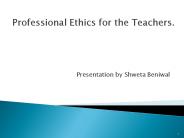Ch 3 Professional Ethics - PowerPoint PPT Presentation
1 / 15
Title:
Ch 3 Professional Ethics
Description:
Need for a Code of Conduct in the CPA Profession. CPA has responsibility to the public--S/H, creditors, ... Spouse & dependents--Rules same as for the CPA ... – PowerPoint PPT presentation
Number of Views:108
Avg rating:3.0/5.0
Title: Ch 3 Professional Ethics
1
Ch 3 Professional Ethics
2
Background
- Ethics are standards of conduct and moral
judgment - Relate to behavior with respect to relationships
among people - General ethics are set by certain societal
standards, religious beliefs laws - All recognized professions have a Code of Ethics
governing professionals behavior
3
General Steps in Resolving an Ethical Delimma
- Identify the problem
- Identify possible courses of action
- Identify any constraints relating to the decision
- Analyze likely effects of the possible courses of
action - Select the best course of action
- See reporting hours issue/text
4
Need for a Code of Conduct in the CPA Profession
- CPA has responsibility to the public--S/H,
creditors, employees, govt agencies relying on
CPAs attestation on fairness of F/S - Complex body of knowledge required
- Standards required for admission to the
profession - Public has need for confidence in profession
5
Code of Conduct in the CPA Profession
6
The AICPA Code of Professional Conduct--Section
I--Principles
- Preamble--profession has responsibility to the
public - Article I--Responsibilities
- Article II--The Public Interest
- Article III--Integrity
- Article IV--Objectivity Independence
- Article V--Due Care
- Article VI--Scope Nature of Services
7
The AICPA Code of Professional Conduct--Section
II--Rules
- Rule Title
- 101 Independence
- 102 Integrity Objectivity
- 201 General Standards
- 202 Compliance with Standards
- 203 Accounting Principles
- 301 Confidential Client Information
- 302 Contingent Fees
- 501 Acts Discreditable
- 502 Advertising Other Forms of
Solicitation - 503 Commissions Referral Fees
- 504 (Deleted)
- 505 Form of Organization Name
8
Rule 101--Independence
- Interpretation 101-1--during the period of the
engagement or when expressing an opinion,
independence will be impaired if - Member had any direct or material indirect
interest in the enterprise - Was trustee/executor in an estate
- Had any joint bsns investment with officer,
director, etc. that was material - Had any loan from enterprise or officer,etc
9
Effects of Relatives Bsns Financial Interests
on Auditors Independence
- Spouse dependents--Rules same as for the CPA
- Close relatives--Independence will be impaired if
- Bsns position has significant influence
- Position is audit sensitive
- Relative has material financial interest
- Other relatives--Normally no effect on
independence
10
Public Company Audit Rules for Independence per
SEC
- Following services are prohibited for audit firm
on a Public Company audit - Bookkeeping
- Fin. information systems design
- Appraisal or valuation services
- Actuarial services
- Internal auditing-outsourcing
- Management or HR services
- Various investment services
- Legal services
- Expert witness
- Certain tax services
11
Rule 202 Standards
- Technical Body
- Auditing Standards Board (ASB)
- Public Company Accounting Oversight Board (PCAOB)
- Mgt Consulting Services Exec. Comm. (MCSEC)
- Acctg Review Services Comm. (ARSC)
- FASB and GASB
- Standards
- Stmts on Auditing Standards
- Stmts of PCAOB
- Stmts on Standards for Consulting Services
- Stmts on Standards for Acctg Review Services
- FASB and GASB Stmts
12
Authority Coordination of CPA Organizations
Regulatory Bodies
- AICPA--lays out general rules for voluntary
membership - State Societies--have own rules for State
membership (often adopt AICPA Rules, but not
necessarily) - State Regulatory Bodies--have authority of State
Statutes and Licensing Authority--Statutes passed
by legislature often AICPA Rules, but not
necessarily - PCAOB regulates CPA firms with Public Company
Audits
13
Other Codes of Ethics
- Institute of Internal Auditors has Code for its
members - Institute of Management Accountants has Code for
its members - Other accounting and auditing professions may
have their own Codes
14
Actual Case in Resolving an Ethical Dilemma
- Identify the problem--financial results were 2M
loss CEO ordered loss reserves decreased by 3M
or NI of 1M - Identify possible courses of action
- Identify any constraints relating to the decision
- Analyze likely effects of the possible courses of
action - Select the best course of action--WHAT WOULD YOU
DO?
15
Current Issues
- Future procedures and authority of PCAOB































